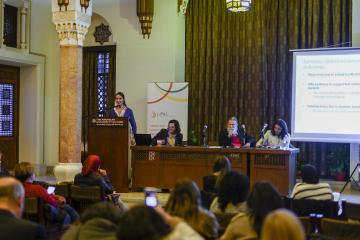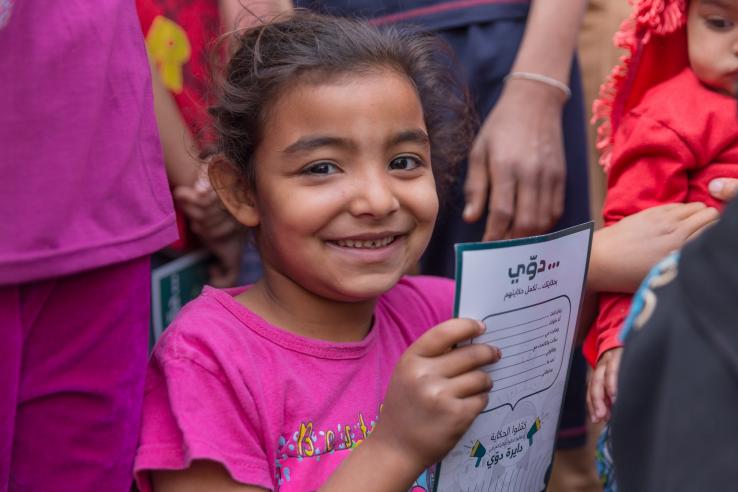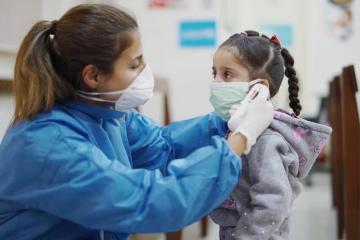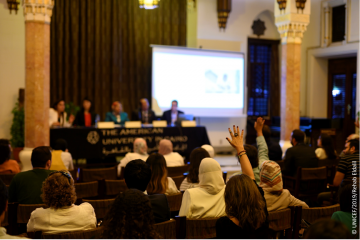
Shifting social and gender norms for improved development outcomes: A recap from the Global Evidence for Egypt Spotlight Webinar

While Egypt has made some progress towards gender equality and girls’ and women's empowerment, traditional gender roles and power dynamics continue to persist. Egypt has one of the highest gender gaps in the world, ranking 134th out of 153 countries in the World Economic Forum’s 2020 Global Gender Gap Report. This raises important questions about how to improve gendered outcomes and shift social norms to advance the overall wellbeing of girls and women in Egypt.
J-PAL Middle East and North Africa (J-PAL MENA) at the American University in Cairo School of Business held a webinar with UNICEF Egypt on March 9, 2021 to share global evidence on shifting social and gender norms for improved development outcomes in favor of girls and women. This webinar (video here) was the fourth in our Global Evidence for Egypt Spotlight Seminar Series, which fosters conversation between Egyptian policymakers, development practitioners, and J-PAL affiliated researchers on rigorous evidence addressing timely policy priorities in Egypt.
The webinar featured presentations and discussion from J-PAL affiliate Eliana La Ferrara, Fondazione Romeo ed Enrica Invernizzi Chair in Development Economics at Bocconi University; Dr. Naglaa El Adly, General Director of the External Relations and International Cooperation Department at the National Council for Women (NCW) in Egypt; and Dina Heikal, Communications for Development Officer at UNICEF Egypt.
Professor La Ferrara opened the panel by sharing key insights from rigorous global evidence on encouraging behavior change and shifting norms to improve development outcomes. Dr. El Adly then highlighted initiatives led by NCW to improve the conditions of girls and women in all Egyptian governorates. Ms. Heikal concluded the panel by emphasizing the importance of focusing on young girls’ empowerment and positive gender socialization, as well as highlighting the need for multisectoral approaches and joint efforts to transform gender norms.
Efforts to advance the status of girls and women in Egypt
Egyptian policymakers have achieved substantial progress towards gender equality and girls’ and women's empowerment in recent years. In her remarks, Dr. ElAdly conveyed that the NCW implemented a series of advocacy campaigns throughout the past three years to achieve the National Strategy for the Empowerment of Egyptian Women 2030. The strategy aims to improve the status of girls and women through four main pillars: political empowerment and leadership, economic empowerment, social empowerment, and protection.
The NCW has also implemented several programs and campaigns to change behaviors and gendered stereotypes. One such campaign, “Knocking Doors,” has reached 35 million women to date via in-person awareness-raising conversations with women in villages on topics related to violence against women, legal rights, and political participation. Another nationwide campaign, “The Secret of Your Power,” has reached 153 million people and has focused on highlighting women’s strength, addressing misconceptions, redefining gender roles, and fostering women’s participation in all spheres.
Recognizing the importance of engaging men and boys on issues related to gender equality, several NCW campaigns target broader audiences. For instance, the “Because I am a Man” campaign has reached 480,000 men in person and 17 million viewers on social media, and a campaign focused on combatting female genital mutilation has reached 54 million people, including women, men, and children. These campaigns, among others, have aimed to address the impact of social and gender norms on the lives of girls and women, attempting to replace harmful norms with more positive ones.
Key lessons from evidence on social and gender norms
Gendered social norms can perpetuate harmful behavioral practices, create direct and indirect barriers to education and employment, and in turn limit girls’ and women’s overall aspirations and wellbeing. Exposure to new ideas and practices, as well as economic empowerment and reformed legal frameworks, often play interconnected roles in changing attitudes about gendered expectations. Eliana La Ferrara offered four key lessons from the global evidence on fostering behavior change to shift norms and overcome gendered inequalities.
Gender norms can moderate or block intended program impacts.
Norms and biases surrounding women’s supposed societal role can limit the impacts of interventions that aim to support women. Evidence from India, Ghana, Sri Lanka, and Pakistan suggests that gender norms hindered the impact of programs that attempted to empower women and increase their agency, regardless of whether or not gender dynamics were considered in the program design.
Access to resources alone is not equivalent to control of those resources. Programs that address multiple gender constraints are promising but need more research.
Researchers found that access to financial resources alone, without addressing household dynamics or gender norms, does not consistently improve gender roles or women’s agency. Evidence from Zambia and the Philippines indicates that programs that offer resources might be more successful if they employ design features to give women more control over those resources.
It also suggests that bundled interventions that provide women with assets as well as training on soft skills and raising awareness on gender dynamics have positive effects on women, although more research is needed on cost-effectiveness and main drivers of change.
Opportunities to enhance women’s agency change throughout a woman’s life.
Several evaluations in India, Bangladesh, Malawi, Pakistan, and Kenya illustrate that despite having positive impacts on women’s marriage and childbearing decisions, employment and cash or in-kind transfer programs had little effects on intra-household gender dynamics and decision-making patterns. These findings suggest that it may be more challenging to enhance women’s agency within a marriage relative to the decision to marry itself.
Recent interventions that directly tackle beliefs and norms are promising but need more research.
Shifting social norms related to gender is challenging, yet attainable. Some evaluations in India, Nigeria, Uganda, and Saudi Arabia find that education through classroom discussions, edutainment through mass media, correcting beliefs and misperceptions, and replacing regressive norms with more equitable ones may have a positive impact in changing attitudes about gender.
J-PAL MENA will continue to engage policymakers, development practitioners, and J-PAL affiliates in discussions on priority issues and development challenges in Egypt. Subscribe to J-PAL MENA’s biannual newsletter and follow us on Twitter, Facebook, and LinkedIn to find out about future events and webinars.
Related Content

Strengthening the Egyptian education system: A recap from the Global Evidence for Egypt spotlight seminar on education

Designing adaptive social assistance during COVID-19: A recap from the Evidence for Egypt Spotlight Webinar


